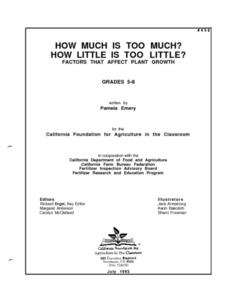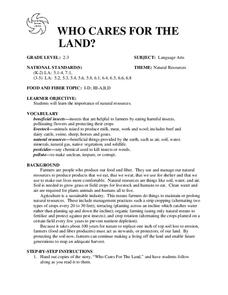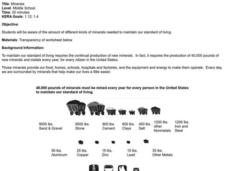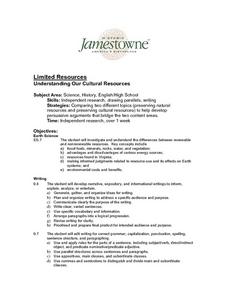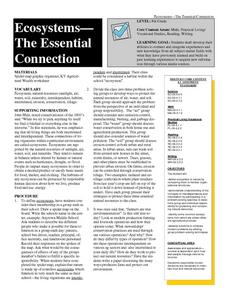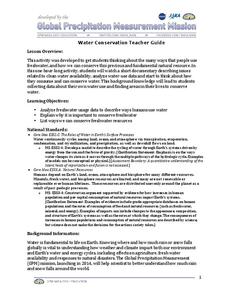Curated OER
Let's Rock
Students investigate the property of rocks and how to distinguish among the different types. They explore the hardness of rocks and perform streak tests to determine mineral color. They classify rocks according to their properties.
Curated OER
Rockin' Chalk
Fourth graders access prior knowledge of rocks and minerals. In this petroglyphs activity, 4th graders become familiar with artwork on rocks. Students create original artworks using rock art.
Curated OER
Let's Take a Rock Apart!
Young scholars examine a crushed rock and sort the minerals they find in that rock by color and other properties.
Curated OER
Rockin? Chalk (Integrating science - make own chalk)
Students use plaster of Paris, talc, and cornstarch to create their own chalk. They hypothesize what mixture of ingredients produce the "best" chalk. Students discuss what they think are the characteristics of the "best" chalk.
Curated OER
How Much Is Too Much? How Little Is Too Little?
Students perform a series of experiments which show that plants require nutrients in certain quantities. They also cooperatively read materials on the nutrient requirements of plants, fertilizers, composting, and soil management, and...
Curated OER
WHO CARES FOR THE LAND?
Students explore the importance of natural resources. They are given copies of the story, "Who Cares For The Land," and students follow
along as the teacher reads it. Students identify the key points in the story. (Soil, water and air...
Curated OER
Computer Lab Lesson Plan - Science
Students examine rocks and minerals. Using the internet, students research rocks and how they are formed. They use word processing software to list minerals and materials that form specific rocks.
Teach Engineering
Catching the Perfect SAR Waves!
Zero in on an interesting resource involving radar technology. Groups construct a radar sensing unit and learn to calibrate the system. Using the radar system and the Pythagorean Theorem, they calculate distances between objects.
NOAA
Subduction Zones
Sink into an interactive learning experience about subduction zones! Junior oceanographers examine the earth-shaking and earth-making effects of subduction in the fourth installment in a 13-part series. Hands-on activities include...
Curated OER
Rocks, Minerals, and Erosion
Fourth graders describe the difference between minerals (composed of the same substance throughout) and rocks (composed of two or more minerals). They recognize that there are three classes of rocks: igneous, sedimentary, and metamorphic
Curated OER
Name that Natural Resource
Students discuss natural resources. In this science lesson, students understand that physical properties can be used to identify minerals and complete the chart each day working alone or in a small group.
Curated OER
Rocks and Minerals
Students research a rock or mineral on the Internet. They perform the research with a partner to find out properties such as, color, hardness, and opacity. They look for pictures on the Internet in order to prepare for their slideshow...
Curated OER
Minerals
Learners explore the concept of minerals. In this minerals instructional activity, students discuss how cooling affects the size of crystals. Learners discuss how the structure of minerals is a tetrahedron. Students discuss the structure...
Curated OER
Mineral Lab
Eighth graders examine the physical properties of different minerals. In this earth science lesson, 8th graders explain the uses of minerals in their daily lives. They complete the mineral identification table during the lesson.
Curated OER
Minerals
Students become aware of the amount of different kinds of minerals are needed to maintain our standard of living by observing the worksheet. They study how it requires production of 40,000 pounds of new minerals and metals every year for...
Curated OER
Limited Resources - Understanding Our Cultural Resources
Students examine and compare preserving natural resources and preserving cultural resources. They conduct Internet research on two topics, and write a position paper on whether cultural resources or natural resources are more important...
Curated OER
Using Our Natural Resources Wisely
Students understand how ground water can be recycled to maximize its usage and begin to think about ways conservation can help Kansas preserve its natural resources in other areas - soil, minerals, and clean air.
Curated OER
A Legacy of War -- The Gold Rush and the Foreign Miner's Tax
Students examine the results of the Mexican War from both countries. They analyze the impact of a war for the losing side. They also compare the politics of the time of the Mexican war with those of today.
Curated OER
Ecosystems-The Essential Connection
Students develop their abilities to solve problems both in school and in a variety of situations similar to that they have encountered in life. They define the term ecosystem in nature by comparing them to familiar organizational...
Curated OER
Water Conservation
Open learners' eyes to the challenge of finding safe drinking water – something we often take for granted in our country. The PowerPoint presentation includes images, graphs, diagrams, and even a video to stimulate discussion on how we...
K12 Reader
Water Water Everywhere
The protection of our water supply is the subject of an article used in this cross-curricular reading comprehension worksheet. After studying the passage, readers use information from the text to respond to a series of comprehension...
Curated OER
How Much Folate?
This task includes scaffolding to support the introduction of the writing and graphing of linear inequalities. Then your geometry learners discover that writing down all possible combinations is not feasible so they are led to use...
American Museum of Natural History
Rising CO2! What Can We Do?
It is colorless and scentless, but it makes a large impact on the environment. Learners explore carbon dioxide emissions and what they mean for the environment using an interactive graph. They review changes over time and how they impact...
Virginia Department of Education
Igneous Rocks
High schoolers explore igneous rocks by observing rock samples and considering cooling rates and composition. The third installment of a five-part geology series culminates in an activity where learners use igneous rock...






